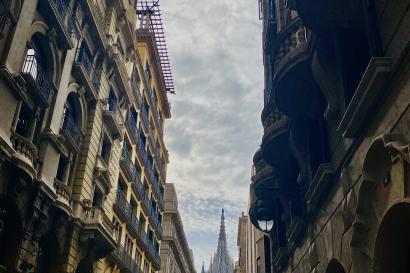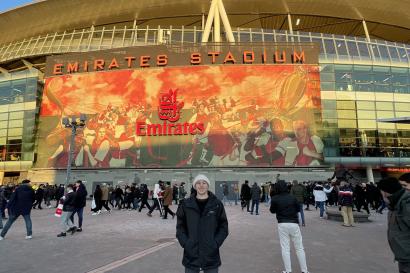
While walking to class, I get stopped at a red pedestrian light in Plaza Cataluña and am quickly swallowed by a crowd of mostly white faces. They chatter in German, English, French, and a few others I can’t quite identify. A red double decker bus chugs past with an array of greying hair, pointing fingers, and camera straps peering over the sides, listening dutifully to the speakers booming from every corner that explain the social importance of the city’s largest square. A few tourists even take pictures of us, the rank and file standing on the curb, waiting to cross the street, just as we do every other day.
I look down. Between rows of Nike’s and Adidas’s, a frantic Sharpie has scribbled out a message, in English, the global language: “Where are all the locals?” The next line down reads, “Tourism kills the city.” As I cross the street I find more of the same, “Tourists go home.” “The city is dying.” “Where are the locals?”
Barcelona is a city of 1.6 million residents and over 23 million annual visitors. During summer months, seven cruise ships are allowed to dock each day in its Mediterranean bay. The city’s residential population has declined by more than 10% over the past four years, a major factor being an increase in housing prices. As companies like Airbnb gain popularity by selling private suites for short stays at high prices, locals are unable to afford long term rent. The same is true of businesses. Plaza Cataluña, where I go to school each morning, has a McDonald’s on every single corner. The one closest to my school took over its space from a family-owned bookshop about three years ago. The city used to be a hub for textiles, shipping, and, at one point, slave trading, but since 1970, tourism has been the nation’s biggest economic contributor. Barcelona has the fourth largest GDP of any European city, and the vast majority of it comes from foreign spenders.
The few locals I know tell stories of a bygone age when they could count the number of tourists they saw each day on one hand, when they could go to the Boqueria Market to chat casually with friends, when they could sneak into Parc Güell under the moonlight and dance with their high school sweethearts. Now, all of it is gone, trampled, pointed at and photographed by middle-aged couples from Brussels, big groups from China, and American college students hoping to see Europe for the first time.

Max Stainton
<p>I'm a nerdy adrenaline-junkie with a guilty conscience. I love reading dusty books and practicing piano, I don't count it as an adventure unless there is a possibility of death, and I volunteer compulsively. Oh, and I'm weirdly good at foosball.</p>








